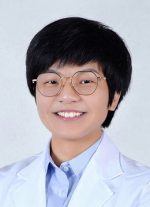Presentation title
Integrated Acupuncture and Herbal Therapy for Refractory Migraine with Autonomic Dysfunction : A Case Report
Scheduled
Day 2, 12:00
Presentation summary
Co-Authors :
Peihsin HSU, Department of Chinese Medicine, China Medical University Hospital, Taichung, Taiwan
Yu-Chen LEE, Department of Acupuncture, China Medical University Hospital, Taichung, Taiwan
Graduate Institute of Acupuncture Science, China Medical University Hospital & Chinese Medical Association of Acupuncture (CMAA), Taichung, Taiwan
Introduction :
Migraine with autonomic and gastrointestinal symptoms is a complex clinical challenge, especiallyin refractory cases. This report presents a 52-year-old male with intractable migraine, daily headaches, autonomic dysfunction, and GI symptoms who improved with integrative acupuncture therapy.
Case Presentation :
The patient had severe migraine, daily watery diarrhea, nighttime hot flashes, dry mouth,dizziness, dry eyes, insomnia, and a reversed sleep-wake cycle. Tests showed adrenal insufficiency (cortisol <0.4), pancolitis (via colonoscopy), and autonomic dysfunction: reduced cardiovagal activity on RRIV anddecreased sudomotor function via Sudoscan. Conventional treatments (fremanezumab, topiramate,propranolol, flunarizine, diphenhydramine, metoclopramide) gave partial relief, but autonomic and GI symptoms remained.
Intervention :
TCM assessment identified Liver and Kidney yin deficiency with internal heat, and Spleen qideficiency with dampness.
– Acupuncture: Cuanzhu (BL2), Hegu (LI4), Taichong (LR3), auricular Shenmen (Apr 12–17).
– Herbal decoction : Based on tongue/pulse (dry tongue, pale red body, thin white coating, wiry and weakpulse).
Results:
– Headache dropped from severe to VAS 2/10
– Diarrhea resolved (0–1/day)
– Hot flashes, dizziness, and insomnia improved
– No adverse effects
Conclusion :
Integrative acupuncture and herbal therapy helped relieve migraine with autonomic and GI issues. Parasympathetic dysfunction, confirmed by RRIV and Sudoscan, aligns with evidence that acupuncture enhances vagal tone and HRV. These findings…
Conflict of interest
No

payshin1130@gmail.com
Peihsin Hsu is a first-year resident physician in the Department of Chinese Medicine at China Medical University Hospital, Taiwan.
She holds a Bachelor’s degree in Pharmacy and a degree in Chinese Medicine.
Her clinical interests focus on acupuncture, neurology, and integrative pain management.
She is actively engaged in TCM case reporting and cross-disciplinary research.